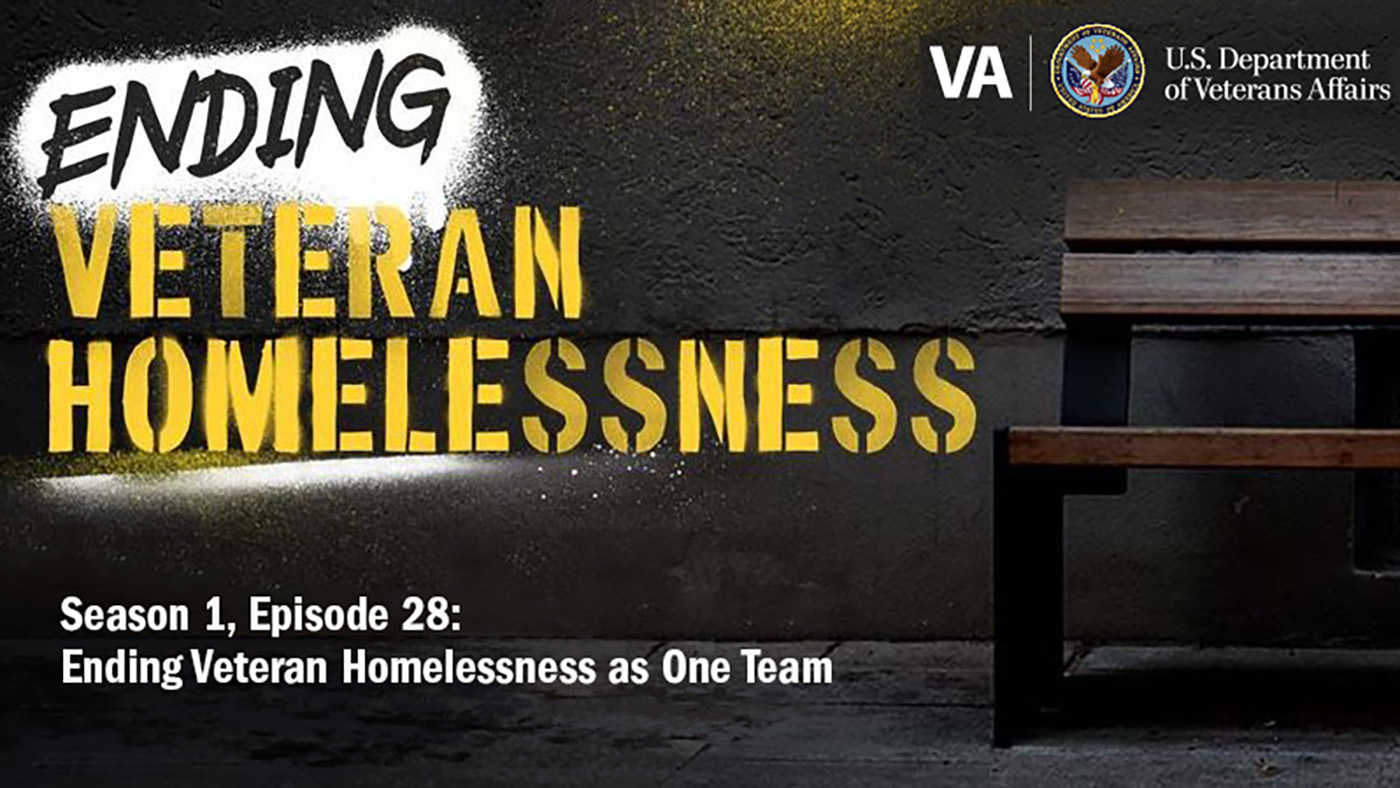“This is a new way of us doing business,” said Jill Albanese, director of clinical operations in the VA Homeless Programs office.
That new way is called “One Team,” and it’s helping VA pick up the pace when it comes to housing Veterans. Albanese recently joined us on the Ending Veteran Homelessness podcast to explore this new approach.
Listen to “S1EP28: Ending Veteran Homelessness as One Team” on Spreaker.
Coordinating the response
Since 2010, we have seen a 52% reduction in Veteran homelessness. However, in recent years that decline began to slow or even stall.
To kickstart progress, VA Secretary Denis McDonough challenged us to house 38,000 Veterans in 2022 and 2023, a goal that we exceeded each year. In 2024, we’re aiming to house 41,000 Veterans. And One Team is crucial to getting there.
One Team takes military philosophies and attitudes about working coherently as a team and applies them to how we deliver homeless programs and services.
Before One Team, many providers, nonprofits, charities, programs and others working with homeless Veterans were often fragmented and siloed. While each excelled in their specific service areas, they did not always coordinate effectively.
Data revealed that these inefficiencies were causing Veterans to fall through the cracks. When a Veteran didn’t qualify for one program or service, they weren’t reliably connected to others they could be eligible for.
“We really have to think of ourselves as one system. It is a culture shift and it’s also going to require all of us to know a little bit more about what resources are available,” Albanese said.
Read VA’s One Team Approach Implementation Toolkit.
One Team in action
On the surface, helping unsheltered Veterans seems like a problem for an outreach staffer. But One Team encourages us to think beyond just identifying an unsheltered Veteran.
We need to have the tools in place to first get the Veteran into transitional housing and then into permanent housing while also providing them with other supportive services.
We’ve put this into practice during unsheltered homelessness surges which bring an influx of personnel and resources from across programs to identify and house unsheltered Veterans sleeping in encampments, bus stations, underpasses and other outdoor locations.
Other examples of One Team in action include:
- Case conferencing: Holding problem-solving meetings attended by various service providers to meet the needs of an individual Veteran.
- Recommitting resources: Shifting employees when necessary to eliminate wait times and get a Veteran into housing quickly.
- Local leadership: Providing instructions on how to develop the local leadership structure needed to implement One Team.
“It sounds easy and it sounds like common sense, but this is a shift and it’s going to take a lot of work. I’m really proud of the work some of the communities are doing to really implement a One Team approach to improve their system and to provide better services and better outcomes to Veterans,” Albanese added.
Learn about VA programs
- If you are a Veteran who is homeless or at risk for homelessness, call the National Call Center for Homeless Veterans at 877-4AID-VET (877-424-3838).
- Visit the VA Homeless Programs website to learn about housing initiatives and other programs for Veterans exiting homelessness.
- Check out the Ending Veteran Homelessness podcast to learn more about what VA is doing about Veteran homelessness.
- Learn how to get involved with housing homeless Veterans.
- Subscribe to the Homeless Programs Office newsletter to receive monthly updates about programs and supportive services for Veterans experiencing or at risk of homelessness.
Topics in this story
Link Disclaimer
This page includes links to other websites outside our control and jurisdiction. VA is not responsible for the privacy practices or the content of non-VA Web sites. We encourage you to review the privacy policy or terms and conditions of those sites to fully understand what information is collected and how it is used.
More Stories
VA delivers the care you have earned—whenever and wherever you need it.
Face it, muscle tension is not good for your health, but you can do something about it in 15 minutes!
For a group of Veterans at the Central Virginia VA Health Care System, Parkinson’s care includes a regular check-in to see what they’ve built with Legos.






I recently Got out of a homelessness situation. Because I received to much comp for war related illnesses and injuries I did not qualify for any homeless grants in the current available in place Grant’s other than a Soldier on civilian non va program I feel that is complete and uttef BS so I saved my comp and ended my homelessness situation.. When Crhronic Vets that a P and T face crisis all grants programs and house should be available to them voiding the income restrictions. PERIOD.
This is great information, I’m impressed and want to help veterans without homes. I helped one once and he appreciated it.
I am a former spouse of a retired Army and disabled veteran. I am facing homelessness as a result, of losing my job. I have not worked in over a year. I am seeking employment but, I haven’t had any luck. Does your grant program officer assistance to help former spouses from becoming homeless? I am 65 and receive Tricare for life, Medicare parts A and B. I also, receive Medicaid benefits.